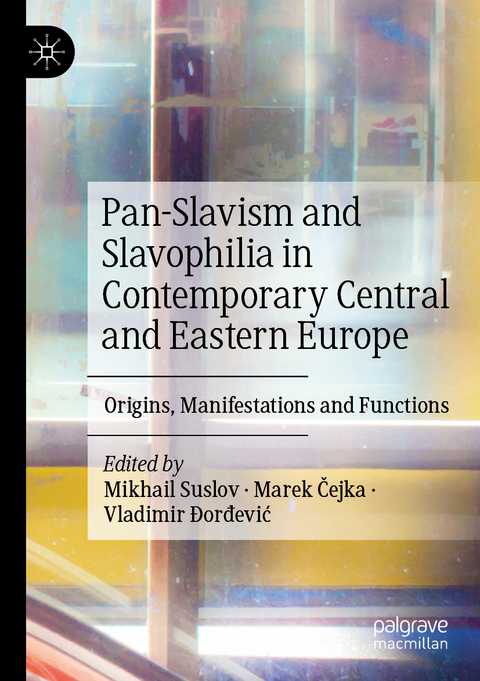
Pan-Slavism and Slavophilia in Contemporary Central and Eastern Europe
Springer International Publishing (Verlag)
978-3-031-17877-1 (ISBN)
Mikhail Suslov is Associate Professor in the Department of Cross-Cultural and Regional Studies at the University of Copenhagen, Denmark, and a former researcher at the Uppsala Centre for Russian and Eurasian Studies, Sweden. He specialises in and teaches Russian (intellectual) history, political ideology, geopolitics, Russian Orthodox Church, contemporary Russian politics and society, and history of Eastern and Southern Europe.
Marek Cejka is Associate Professor in the Department of Territorial Studies at the Mendel University in Brno, Czech Republic, a former assistant at the Constitutional Court of the Czech Republic, and a former researcher at the Institute of International Relations in Prague, Czech Republic. He specialises in the Israeli-Palestinian conflict, the Middle East and Maghreb regions, the relationship between religion and politics, ideologies in the Middle East including Arab nationalism, (radical) Islamism, and Christian fundamentalism.
or evic Vladimir is Assistant Professor in the Department of Territorial Studies at the Mendel University in Brno, Czech Republic. He specialises in the Western Balkans, Europeanisation, democratisation, nationalism, and security-related agendas of the said region.
Chapter 1. Introduction - Examining Pan-Slavism: Conceptual Approach, Methodological Framework, and State of the Art.- Chaper 2. Structure of the Volume.- Section I: Pan-Slavism as History.- Chapter 3. Russian Pan-Slavism: A Historical Perspective.- Chaper 4. A Short History of Pan-Slavism and its Impact on Central Europe in the Nineteenth and Twentieth Centuries.- Chapter 5. Pan-Slavism in the Balkans: A Historical View.- Section II: Pan-Slavism as a (Political) Tool.- Chapter 6. New Wine in an Old Wineskin: Slavophilia and Geopolitical Populism in Putin's Russia.- Chapter 7. Ideational Travels of Slavophilia in Belarus: From Tsars to Lukashenka.- Chapter 8. On Pan-Slavism, Brotherhood, and Mythology: The Imagery of Contemporary Geopolitical Discourse in Serbia.- Chapter 9. Intermarium or Hyperborea? Pan-Slavism in Poland after 1989.- Section III: On Pan-Slavism, Identity, and Other Issues.- Chapter 10. A Distant Acquaintance: Reflecting on Croatia's Relationship with Pan-Slavism.- Chapter 11. On Pan-Slavism(s) and Macedonian National Identity.- Chapter 12. Invented 'Europeanness' versus Residual Slavophilism: Ukraine as an Ideological Battlefield.- Section IV: On Pan-Slavism, East vs. West Divide, and Orthodoxy.- Chapter 13. Bulgaria's Backlash against the Istanbul Convention: Slavophilia as the Historical Frame of Pseudo-Religious Illiberalism.- Chapter 14. Montenegrin Squaring of the Circle: Between Russophilia, Pan-Orthodoxia, and Competing Nationalism.- Chapter 15. Pan-Slavism and Slavophilia in the Czech Republic within the Context of Hybrid Threats.- Chapter 16. Slovakia: Emergence of an Old-New Pseudo-Pan-Slavism in the Context of the Conflict between Russia and Ukraine after 2014.- Section V: An Ethnographic Look on Pan-Slavism.- Chapter 17. Manifestations of Pan-Slavic Sentiments among South Slavic Diaspora Communities in the United States of America.- Chapter 18. Interethnic Ritual Kinship as Pan-Slavism in Bosnia and Herzegovina.
Afterword
"This is a praiseworthy book that both complements Kohn's classic treatment of the subject in his 1953 book Pan-Slavism: Its History and Ideology and updates the story, following right through to the current war in Ukraine. Students of Russian, Belarusian and East European history will profit greatly from reading this new classic." (Sabrina P. Ramet, Europe-Asia Studies, April 29, 2024)
| Erscheinungsdatum | 15.02.2024 |
|---|---|
| Zusatzinfo | XXVII, 428 p. 19 illus., 17 illus. in color. |
| Verlagsort | Cham |
| Sprache | englisch |
| Maße | 148 x 210 mm |
| Gewicht | 592 g |
| Themenwelt | Geisteswissenschaften ► Geschichte ► Regional- / Ländergeschichte |
| Sozialwissenschaften ► Politik / Verwaltung ► Politische Systeme | |
| Schlagworte | Central and Eastern Europe • East European Politics • Ideology • Slavic countries • Slavophilia |
| ISBN-10 | 3-031-17877-7 / 3031178777 |
| ISBN-13 | 978-3-031-17877-1 / 9783031178771 |
| Zustand | Neuware |
| Haben Sie eine Frage zum Produkt? |
aus dem Bereich


